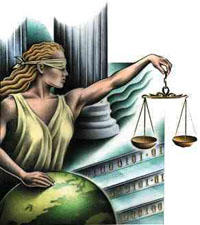One of the last decisions the Supreme Court has handed down this last term was to strip away any semblance of American property rights. The Supreme Court ruled in the case of Kelo vs. New London that the city of
Two points I want to make about this decision and I am sure that one or both will fire a few people up. First, this decision is not quite the death knell for the American property owner as many people are proclaiming. The decision still leaves the ultimate authority in this matter to the states, as it should be in my humble opinion. Many states already have laws on the books that further define the term “public use” as it applies to eminent domain in such a way that the property owner is afforded extraordinary protection from unscrupulous state or local officials looking for a quick tax revenue payoff. The first state that has already passed this protection for property owners is Utah and Michigan’s courts have already shoot down a similar case to the one the Supreme Court just ruled on. I suspect that the outrage that many feel about this decision will translate into many more states passing similar laws to the
The second point is that if the Supreme Court is so hopelessly unbalanced with the interests of the country and creating law through their rulings instead of simply making decisions strictly on the letter or the law, not the intent of the law then Congress must act. The checks and balances designed by the Founding Fathers provided that all three branches of government could work independently, but they did provide for some oversight of each by the others. Take a look at the information from the Constitution below and ponder on it for a moment.
Article. III.
Section. 1.
The judicial Power of the
It is my opinion that since “good behaviour” is not defined it could be used to allow Congress to establish guidelines for the service of Supreme Court Justices. I would suggest that how a justice rules be left out of any guidelines since that would be paramount to censorship through the threat of loss of the judgeship. However, there are guidelines such as a term limitation or upper age limit I would support. Regardless of how I feel about it, Congress does have the means in which to force a change to the make-up of the court. All that remains now is whether they will have the political will to make a change to restore the balance between the three branches of government. The American people are now speaking with a growing voice about the activism of our court system and sooner then later Congress may be forced to act, even if it is only to save their collective political asses. Time will tell I suppose. Have a great day everyone.

No comments:
Post a Comment